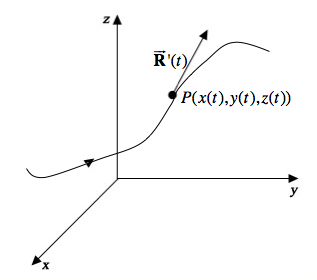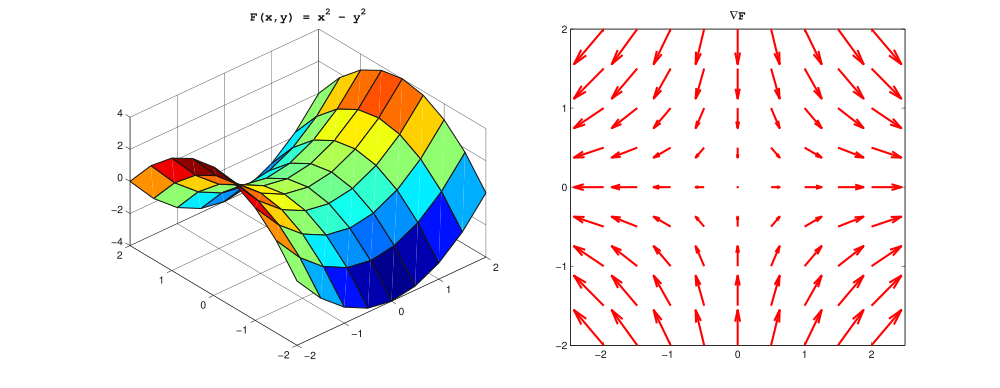

The focus of this course is multivariable calculus, which concerns functions of several variables and functions whose values are vectors rather than just numbers. In this context, we will revisit notions like continuity, derivatives, and integrals, as well as their applications, like finding minima and maxima. We will explore geometric objects such as vector fields, curves, and surfaces in 3-dimensional space, and study how these relate to differentiation and integration.
We will also cover the required background about vectors in 3-dimensional space: dot products, cross products, lines, planes, etc.
The course material corresponds roughly to Chapters 12, 13, and 14 and Sections 15.8, 15.9, 16.1, and 16.5 from the textbook. See the tentative list of topics on the course calendar.
Your course grade will be calculated as follows.
There will be no extra credit.
Update 10/27: The following deal is offered to all students. If your Final is better than your Midterm, then your Final will be worth 50% of your course grade and your Midterm will be worth 20% (instead of 40% and 30%, respectively).
There are two exams: a midterm and a final. Dates will be posted above and on the Lecture Log.
The final exam covers the entire semester.
Details for each exam will be announced as the date approaches. Practice exams will be provided.
All exams will be closed book: notes or class material are not permitted. Calculators or other electronic devices (cell phones, iPods, etc.) are not permitted.
Homework will be assigned more or less each week. Some homework will be done and submitted online via WeBWorK (see below).
Late homework will not be accepted.
The lowest homework score will be dropped.
On the Lecture Log, each lecture has suggested practice problems from the textbook. Those are for practice only, and will never be collected. Note that answers to odd-numbered exercises are provided at the end of the textbook.
The WeBWorK page for the course is http://webwork.math.uwo.ca/webwork2/Calc2502-F2014/.
Login: Your username is your UWO username (e.g. mine is mfrankla). Your initial password is your UWO Student ID, consisting of 9 digits, usually 250XXXXXX. Please change your password after logging in for the first time.
Diagnostic test: There are practice problem sets serving two purposes: for you to get used to WeBWorK, and to review the prerequisites of the course. Practice problem sets do not count toward your grade. The first one is called "Chap1_Functions". Real homework sets are called HW1, HW2, etc.
CAREFUL: Homework problems on WeBWorK have a maximum of 10 attempts to get a correct answer. After that, the problem is marked as wrong, and there is no way to get credit for it.
Notation and format: For documentation on how to write your answers in WeBWorK, consult: http://webwork.maa.org/wiki/Available_Functions. Vectors are denoted by angled brackets, for example <5,-1,2>.
Exact answers are preferred whenever possible, for example sqrt(3) or (7/2)*pi. When numerical answers are provided, they should be correct to 5 significant digits.
Additional documentation can be found at http://webwork.maa.org/documentation.html.
If you have a conflict with one of the exam times, please consult the Faculty of Science policy on missed course work. Based on that, if you think your situation qualifies you to take the conflict exam, please contact me as soon as possible, no later than a week before the exam in question.
If you are unable to meet a course requirement due to illness or other serious circumstances, you must provide valid medical or other supporting documentation to the Dean's Office as soon as possible and contact me immediately. It is your responsibility to make alternative arrangements with me once the accommodation has been approved. In the event of a missed final exam, a "Recommendation of Special Examination" form must be obtained from the Dean's Office.
For further information, please consult the University policy on medical accommodation.
As mentioned above, late homework will not be accepted. Homework can always be submitted in advance. For extended absences or medical emergencies, these are handled the same way as for exams. In that case, a homework grade could be dropped; there will be no make-up homework.
Working on homework with your peers is allowed, in fact encouraged. However, each student must write their own solutions. Handing in suspiciously similar solutions will be considered an instance of cheating.
Scholastic offences are taken seriously and will not be tolerated. For more information, please consult the University policy on scholastic discipline.
Please consult Services for Students with Disabilities (SSD) regarding accessibility services on campus. Please contact me if you require material in an alternate format or other accommodations to make this course more accessible to you.